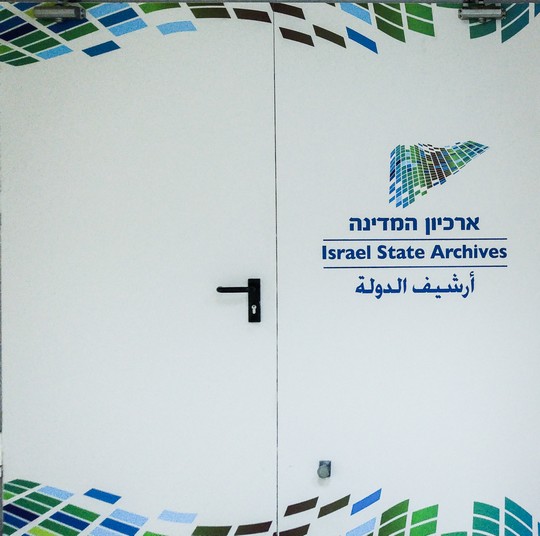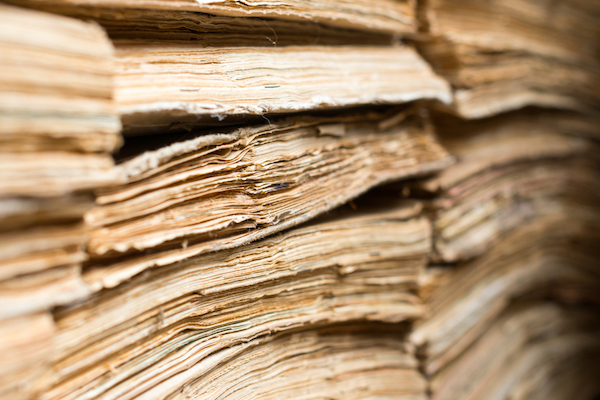Israel’s state archivist confirms that nearly half a million pages have been sent to the IDF Censor, which has redacted historical documents that already saw the light of day, and talks about why he didn’t foresee the storm that erupted over his decision to end access to paper documents.

Israel’s state archivist did not foresee the storm that erupted this week over his decision to end public access to the Israel State Archives’ physical documents as part of a otherwise welcomed digitization process.
Historians, academics and civil liberties groups are worried by the lack of public debate surrounding the changes, in addition to the IDF Censor’s role in the digitization and online publication historical documents.
In an article published here on Tuesday, two groups of historians and academics argued that in other countries national archives undergoing digitization are maintaining access to physical paper documents, and that for various reasons, losing access to the paper originals harms the ability to conduct historical research.
Several hours after the publication of the original article, I managed to finally speak with State Archivist Yaacov Lozowick about the changes he is making and the unexpected response it stirred up. (The State Archives had not responded to our request for comment prior to the publication of the original article.) In the interview Wednesday, it also became clear that the IDF Censor’s role in the State Archives is far more comprehensive than was previously stated or understood.
“I’m astounded by people, some of whom make a living from media outlets that are only digital, or who work in the digital world, who are attacking us for moving from paper to digital,” Lozowick said at the start of the telephone interview. “We have limited resources, and we cannot do it all. We needed to decide: either paper or online, and we decided to focus on online.”
“I hear and I read people explaining why moving to digital documentation severely — or even fatally — harms historical research. I never imagined that serious and educated people would make such arguments in 2016. It seemed like such a clear choice. Furthermore, we presented the process in various forums. There are cabinet decisions from 2012 and 2014, there were discussions on the Archives’ blog, and there were other articles on the matter.”
But the cabinet decisions and the other articles only dealt with the digitization process, not the accompanying decision to cut off access to the paper archives. There’s no argument that digitization is a good thing, only about the fact that there will be no more access to the original paper documents.
“Perhaps. I didn’t make that distinction myself, and there was no prior decision about it. A few weeks before we launched the new website the logistical team told me that we need to choose one or the other, so I chose digital and not paper. By the way, that was the second time I’ve made that decision. In 2000, when I was the director of archives at Yad Vashem, we made the same decision and we moved all viewing over to microfilm and photographs. In exceptional cases when people were able to explain why they needed to see the originals, we allowed them to view [the originals]. We will do the same now.”
“So I admit, I didn’t conduct a broad public process because it didn’t occur to me that it would bother anybody at all. If you look at a scanned document on the website you’ll see that everything is preserved: the front and back sides, hand-written annotations, notes, everything. And you can work with that, engineer it, add annotations, perform OCR (optical character recognition). If I had those tools when I was doing my doctorate I would have finished it in two years.”

I move the conversation to the State Archives’ relationship with the IDF Censor. By law in Israel, any article or publication in Israel that touches on a number of designated topics must be approved by the military censorship apparatus. The IDF Censor has been expanding the types of publications over which it demands compliance in recent months.
Lozowick says that around 5 percent — but no more than 10 percent — of the digitized materials in the archives have been sent to the IDF Censor for approval. To put that in proportion, according to the State Archives over 9 million pages of documents have been scanned thus far, which means that it has sent almost half a million pages to the IDF Censor. Israel’s censorship regulations, by the way, largely forbid revealing what documents — or even which specific words — have been stricken by the censor.
The problem with all of this, according to the historians, academics and civil liberties groups who oppose the current process, is that it is turning the IDF Censor into an additional, filtering layer that stands between state documents and the public. In the past when the State Archives staff (who are obligated to take state security into consideration when making decisions about whether to unseal specific documents) decide to unseal a document, it would become available in the viewing room and would not be scanned, or it would be scanned but the censor would bar its publication online. Either way, it would still be available to researchers in the Archives’ viewing room, so argue those who oppose the new process.
“There’s not actually anything new here,” Lozowick retorts. “For a few years, since before my time here, the IDF Censor has demanded that all of the [various government] archives send them any materials that deal with matters of security, in accordance with the law. It’s been happening for years and it never bothered anybody. Where did the problem come from? We sent a tsunami of materials to the censor for review, and those will be dealt with. And in the meantime there’s a possibility that some materials slipped through the cracks and made it to the viewing room, materials that we approved, which should have gone to the censor. But once we deal with this one-off situation we’ll go back to a situation where nobody notices it (the censorship process, h.m.).”
“By the way, the gap between what we unseal [under the authority of the archive law] and what the censor objects to is very narrow. It’s a single-digit percentage or even less. Our team and the Censor’s staff are familiar with the same materials, and their decisions are usually the same decisions. And yet in practice, if we see that the censor has objected to something that we had already placed in the viewing room and which people are already reading, and then when we upload it to the Internet the Censor tells us that a certain paragraph needs to be redacted — we redact the material in the physical viewing room as well.”
(Read more here about documents that mysteriously disappeared from the State Archives after already being published and written about.)
You’re saying that you gave the Censor a foothold in the Archives’ viewing room even though the law doesn’t authorize them to prevent the unsealing of documents there?
“Yes. They told us that it’s inconceivable for there to be different authorities, with different laws, where one authority unseals something and the other doesn’t. That gap was discovered a few years ago and it was closed a while ago — for better or for worse. If we had insisted that we are separate from the Censor and that they cannot interfere in [what we unseal] because the law doesn’t allow them to, it’s reasonable to assume that they would change the law and then we would be subordinate [to the Censor] in the [Archives’] viewing room.”
“If there is a good reason why something should be redacted and we hadn’t noticed it, then we’ll fix it and re-seal it and redact it. There is also the opposite situation where we argue with them and they accept our position and the materials remain unsealed.”
“Six months or a year from now, when we clear this backlog that has been created, we will give the Censor everything as partners in our process. We are trying to include them in our process.”
You mean, the censor will work from inside the archives?
“Yes, they’ll just be here. Digitally there are various ways of doing it. We are working hard with them to find a way. Instead of us looking at [a document] and then they look at it and then we either make the requested changes or argue about it — so we can do it all more efficiently.”
A version of this article first appeared in Hebrew on Local Call. Read it here.

